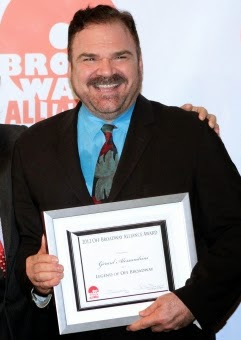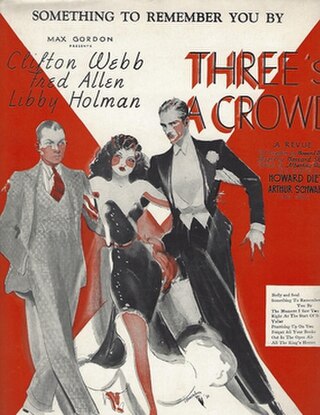| Make Mine Manhattan | |
|---|---|
 Sheet music | |
| Music | Richard Lewine |
| Lyrics | Arnold Horwitt |
Make Mine Manhattan is a 1948 Broadway revue with music by Richard Lewine, lyrics by Hassard Short, and sketches by Arnold Horwitt and produced by Joseph Hyman. [1]
| Make Mine Manhattan | |
|---|---|
 Sheet music | |
| Music | Richard Lewine |
| Lyrics | Arnold Horwitt |
Make Mine Manhattan is a 1948 Broadway revue with music by Richard Lewine, lyrics by Hassard Short, and sketches by Arnold Horwitt and produced by Joseph Hyman. [1]
Make Mine Manhattan premiered on Broadway at the Broadhurst Theatre on January 15, 1948, and closed on January 8, 1949, after 429 performances. It has previously had a tryout in Philadelphia at the Forrest Theatre for two weeks starting December 23, 1947. [2]
It was staged and lighted by Hassard Short, with sketches directed by Max Liebman; music directed by Charles Sanford; choreography by Lee Sherman, settings by Frederick Fox and costumes by Morton Haack. [3]
The company included Sid Caesar, in his Broadway debut, David Burns, Sheila Bond, Jack Kilty, Wayne Lamb, Kyle MacDonnell, Joshua Shelley and others. Brooks Atkinson of The New York Times called it "a very pleasant musical revue." [4]
David Ewin described the show as follows: "Perhaps its greatest significance lay in the fact that it introduced Sid Caesar as one of the supreme comics of our time." [5]

Isaac Sidney Caesar was an American comic actor, comedian and writer. With a career spanning 60 years, he was best known for two pioneering 1950s live television series: Your Show of Shows (1950–1954), which was a 90-minute weekly show watched by 60 million people, and its successor, Caesar's Hour (1954–1957), both of which influenced later generations of comedians. Your Show of Shows and its cast received seven Emmy nominations between the years 1953 and 1954 and tallied two wins. He also acted in films; he played Coach Calhoun in Grease (1978) and its sequel Grease 2 (1982) and appeared in the films It's a Mad, Mad, Mad, Mad World (1963), Silent Movie (1976), History of the World, Part I (1981), Cannonball Run II (1984), and Vegas Vacation (1997).

Your Show of Shows is a live 90-minute variety show that was broadcast weekly in the United States on NBC from February 25, 1950, through June 5, 1954, featuring Sid Caesar and Imogene Coca. Other featured performers were Carl Reiner, Howard Morris, Bill Hayes, baritone singer Jack Russell, Judy Johnson, the Hamilton Trio and the soprano Marguerite Piazza. José Ferrer made several guest appearances on the series.

Imogene Coca was an American comic actress best known for her role opposite Sid Caesar on Your Show of Shows. Starting out in vaudeville as a child acrobat, she studied ballet and wished to have a serious career in music and dance, graduating to decades of stage musical revues, cabaret and summer stock. In her 40s, she began a celebrated career as a comedian on television, starring in six series and guest starring on successful television programs from the 1940s to the 1990s.
Michael Stewart was an American playwright and dramatist, librettist, lyricist, screenwriter and novelist.
Peter Gennaro was an American dancer and choreographer.

Philip "Fyvush" Finkel was an American actor known as a star of Yiddish theater and for his role as lawyer Douglas Wambaugh on the television series Picket Fences, for which he earned an Emmy Award for Outstanding Supporting Actor in a Drama Series in 1994. He is also known for his portrayal of Harvey Lipschultz, a crotchety history teacher, on the television series Boston Public.
Martin Charnin was an American lyricist, writer, and theatre director. Charnin's best-known work is as conceiver, director, and lyricist of the musical Annie.

The Shubert Theatre is a Broadway theater at 225 West 44th Street in the Theater District of Midtown Manhattan in New York City. Opened in 1913, the theater was designed by Henry Beaumont Herts in the Italian Renaissance style and was built for the Shubert brothers. Lee and J. J. Shubert had named the theater in memory of their brother Sam S. Shubert, who died in an accident several years before the theater's opening. It has 1,502 seats across three levels and is operated by The Shubert Organization. The facade and interior are New York City landmarks.

Admiral Broadway Revue is an American live television variety show that ran from January 28 to June 3, 1949. The show was notable for being "television's first full scale Broadway type musical revue."

As Thousands Cheer is a revue with a book by Moss Hart and music and lyrics by Irving Berlin, first performed in 1933. The revue contained satirical sketches and witty or poignant musical numbers, several of which became standards, including "Heat Wave", "Easter Parade" and "Harlem on my Mind". The sketches were loosely based on the news and the lives and affairs of the rich and famous, as well as other prominent personalities of the day, such as Joan Crawford, John D. Rockefeller, Jr., Noël Coward, Josephine Baker, and Aimee Semple McPherson.

Gerard Alessandrini is an American playwright, parodist, actor and theatre director best known for creating the award-winning off-Broadway musical theatre parody revue Forbidden Broadway. He is the recipient of Tony Honors for Excellence in Theatre, an Obie Award, four Drama Desk Awards, an Outer Critics Circle Award, and two Lucille Lortel Awards, as well as the Drama League Award for Lifetime Achievement in Musical Theatre.
Alive and Kicking is a musical revue with sketches by Ray Golden, I.A.L. Diamond, Henry Morgan, Jerome Chodorov, Joseph Stein, Will Glickman, John Murray, and Michael Stewart; music by Hal Borne, Irma Jurist, Sammy Fain, Hoagy Carmichael, Harold Rome, Sonny Burke, Leo Schumer, and Ray Golden; and lyrics by Paul Francis Webster, Ray Golden, Harold J. Rome, Leonard Gershe, Sid Kuller, and Michael Stewart.
Inside U.S.A. is a musical revue by Arthur Schwartz (music) and Howard Dietz (lyrics). It was loosely based on the book Inside U.S.A. by John Gunther. Sketches were written by Arnold M. Auerbach, Moss Hart, and Arnold B. Horwitt.

Lend an Ear is a musical revue with a book, music, and lyrics by Charles Gaynor and additional sketches by Joseph Stein and Will Glickman.

Oh! Calcutta! is an avant-garde, risque theatrical revue created by British drama critic Kenneth Tynan. The show, consisting of sketches on sex-related topics, debuted Off-Broadway in 1969 and then in the West End in 1970. It ran in London for over 3,900 performances, and in New York initially for 1,314. Revivals enjoyed even longer runs, including a Broadway revival that ran for 5,959 performances, making the show the longest-running revue in Broadway history at the time.

Hubert Edward Hassard Short, usually known as Hassard Short, was an actor, stage director, set designer and lighting designer in musical theatre who directed over 50 Broadway and West End shows between 1920 and 1953. Theatre historian Ken Bloom called him "one of Broadway's greatest directors and lighting designers", while theatre writer John Kenrick described him as a "groundbreaking director and choreographer".
Michael "Wayne" Lamb was a Broadway dancer, choreographer, theatre director and professor of dance.
Max Liebman was a Broadway theater and TV producer-director sometimes called the "Ziegfeld of TV", who helped establish early television's comedy vocabulary with Your Show of Shows. He additionally helped bring improvisational comedy into the mainstream with his 1961 Broadway revue From the Second City.

Americana is a musical revue in two parts, with book and lyrics by J. P. McEvoy, and music by Con Conrad with additional numbers by George Gershwin, Ira Gershwin, Philip Charig, James Hanley, B. G. DeSylva, Morrie Ryskind, Arthur Schwartz, Theo Goodwin, Joe Young, and Sam Lewis. The show was presented by Richard Herndon at the Belmont Theatre, and, after many postponements, opened July 26, 1926. The show was staged by Allan Dinehart with dance numbers by Larry Ceballos. The production was designed by John Held, Jr. It ran for 224 performances, closing in February 1927. The cast headlined Lew Brice, Roy Atwell, Betty Compton, Charles Butterworth and the Eddie Elkins Orchestra. The New York Times review called it a "witty, ingenious and sophisticated evening of fun-making, it made up in its abundant humor for more than it lacked in some other departments." The other departments referred to were lack of chorus girls and opulent settings.

Three's A Crowd is a 1930 Broadway revue with lyrics by Howard Dietz and others, and music by Arthur Schwartz and others. It was “put together” by Howard Dietz, and produced by Max Gordon.